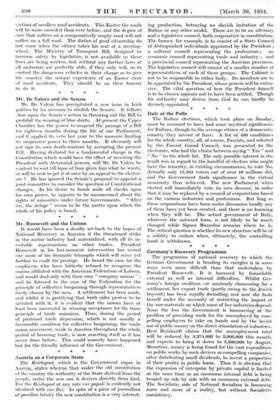Mr. Roosevelt and the Unions It would have been a
deadly set-back to the hopes of National Recovery in America if the threatened strike in the motor industry had materialized, with all its in- evitable repercussions on other trades. President Roosevelt in his last-moment intervention has scored one more of his dramatic triumphs which will serve yet further to exalt his prestige. He heard the case for the employers who have hitherto- refused to recognize the unions affiliated with the American Federation of Labour, and would deal only with their own " company unions " ; and he listened to the case of the Federation for the principle of collective bargaining through representatives freely chosen by the men. A settlement has been made, and whilst it is gratifying that both sides profess to be satisfied with it, it is evident that the unions have at least been successful in winning acceptance for the basic inciple of trade unionism. Thus, during the period of profound trade depression, which is not usually a favourable condition for collective bargaining, the trade union movement, weak in America throughout the whole period of booming trade, is now asserting itself as it has never done before. This could scarcely have happened but for the friendly influence of the Government.








































 Previous page
Previous page